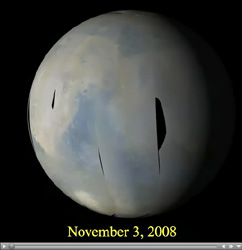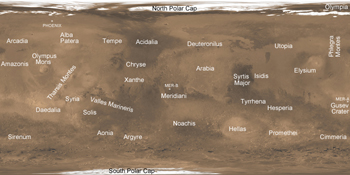
The MARCI acquires a global view of the red planet and its weather patterns every day. Please click on the image above and play the Quicktime movie to see how the weather on Mars changed during this time.
As in previous weeks, notable dust activity continued on Mars this past week. Early in the week, several smaller dust storms were observed near the edge of the residual North Polar Cap. By mid-week, a series of large dust storms coalesced to cloak the southern mid-latitudes. Dust storm activity was also observed closer to the equator over Solis and east of Hesperia. The latter storm has already affected operations at the MER-A (Spirit) landing site in Gusev Crater. Despite relatively clear skies over the Phoenix landing site this past week, the dwindling incoming solar radiation at the landing site proved insufficient for continued operations. After several months of exciting discoveries, the Phoenix mission has officially ended. On a more positive note, the skies over MER-B (Opportunity) in Meridiani remained relatively clear throughout the week.
Earlier Mars Weather Reports are available at the MSSS site.
About the Quicktime Movie:
The movie was generated from images obtained by the Mars Color Imager (MARCI) onboard the Mars Reconnaissance Orbiter (MRO). During a nominal operational week, a total of about 273 MARCI images, taken in three of the camera's seven color filter bands (420, 550, and 600 nanometer wavelengths), are map projected and mosaiced together to produce seven false-color daily global maps. These maps are then projected onto a sphere with north at the top and east to the right and with the mid-afternoon vantage point of an observer in the orbital plane (the imaginary plane that the planet draws out as it circles the Sun). Black areas in the movie are the result of data drops or high angle roll maneuvers by the spacecraft that limit the camera's view of the planet. Equally-spaced blurry areas that run from south-to-north (bottom-to-top) result from the high off-nadir viewing geometry, a product of the spacecraft's low-orbit, 250 km x 316 km (155 miles x 196 miles). The movie is rendered at a lower resolution than the intrinsic 1–2 km nadir resolution that the MARCI provides, so that it is practical to view and share via the Internet. The small white circles on these images of Mars indicate the locations of the two Mars Exploration Rovers, Opportunity (on Meridiani Planum) and Spirit (in Gusev Crater), and the Phoenix landing site (north polar region). Other locations on Mars referenced in the weather report can be found by referring to the map below. Note that the main image of Mars depicted at the top of this catalog page is a single frame from the Quicktime movie.

Click on image for
larger version of Reference MapThe image(s) and caption seen here are value-added products. MSSS personnel processed the images and wrote the caption information. While the image(s) are in the Public Domain, NASA/JPL-Caltech/MSSS requests that you credit the source of the image(s). Re-use of the caption text without credit is plagiarism. Please give the proper credit for use of the image(s) and/or caption.
NASA's Jet Propulsion Laboratory, a division of the California Institute of Technology in Pasadena, manages the Mars Reconnaissance Orbiter for NASA's Science Mission Directorate, Washington. Lockheed Martin Space Systems, Denver, is the prime contractor for the project and built the spacecraft. Malin Space Science Systems, San Diego, provided and operates the Context Camera and Mars Color Imager.

